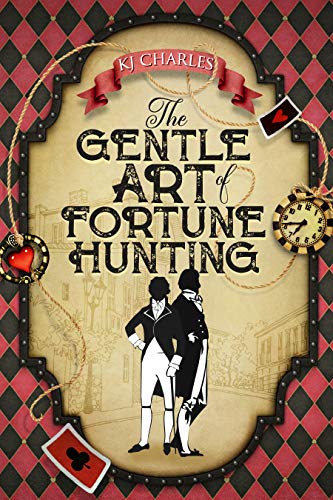“Unlucky in love, lucky at cards,” Robin agreed. The maxim had always held true for him, although he wasn’t so much lucky as manipulative when it came to cards. Mind you, he could say the same about love. [loc. 543]
This was a delight to read: a fizzy, witty, yet substantive Regency M/M romance with Heyeresque tropes and a very non-Heyer perspective on issues of social class, gender and sexuality.
Robin Loxleigh and his sister Marianne have recently arrived in London, hoping for good marriages and determined to make the right impression. They are a likeable pair, and are easily accepted into the life of the Ton: only Sir John Hartlebury (Hart), uncle of the heiress who Robin's set his sights on, is suspicious of this smooth, handsome nobody.
If you spotted the Robin Hood reference in Robin and Marianne's names -- pseudonyms -- you're a step ahead of everyone in the novel. Robin and Marianne have grown up in poverty, experienced abuse and prejudice because of their lowly origins, and are determined to marry money: to rob the rich. Robin's approach is to fleece the nobility at cards: Marianne is targetting a vile but wealthy Marquis, having given up on romantic notions of Love.
Hart is determined to preserve his niece, the unassuming but clever Alice, from the depradations of a heartless fortune-hunter. For himself, he's more or less accepted that he prefers men, and that he must keep that side of his life secret, even from those closest to him. But he can't help noticing Robin, and Robin's mouth ... and perhaps, after all, an arrangement could be negotiated.
The Heyer vibe was strong here, though The Gentle Art of Fortune Hunting is as much a critique of the Regency romance as a loving homage. It's plain that, without deception and fraud, Robin and Marianne don't stand a chance of escaping their lowly origins: it's also clear that Alice, who would rather study mathematics than flirt with her suitors, would get a raw deal in traditional romances. Luckily there are happy endings for all who deserve them.
Also noteworthy are the female characters here: Marianne is utterly marvellous, especially when she's enraged, and Alice is not just a placeholder for Robin's ambitions but a complex woman with ambitions of her own. I cheered at her happy ending. I also very much enjoyed Robin's enthusiastic consent -- not just sexual but social -- in his dealings with Hart. No moral shame here, just a man who knows what he wants, and is happy to advise others on the matter of their desires.
Rating this as five stars made me think about my ratings. I conclude that they reflect my enjoyment of and engagement with a book, not its perceived 'importance' or 'universal appeal' or even whether or not I'd recommend it to everyone I know.
Bonus points for this exchange:
“There is more to life than the pursuit of happiness!”
“Tell that to the United States.” [loc. 3148]
Fulfils the 'cover design by a woman' rubric of the Reading Women Challenge 2021 -- the cover is by Kanaxa, a.k.a. Nathalie Gray.

No comments:
Post a Comment